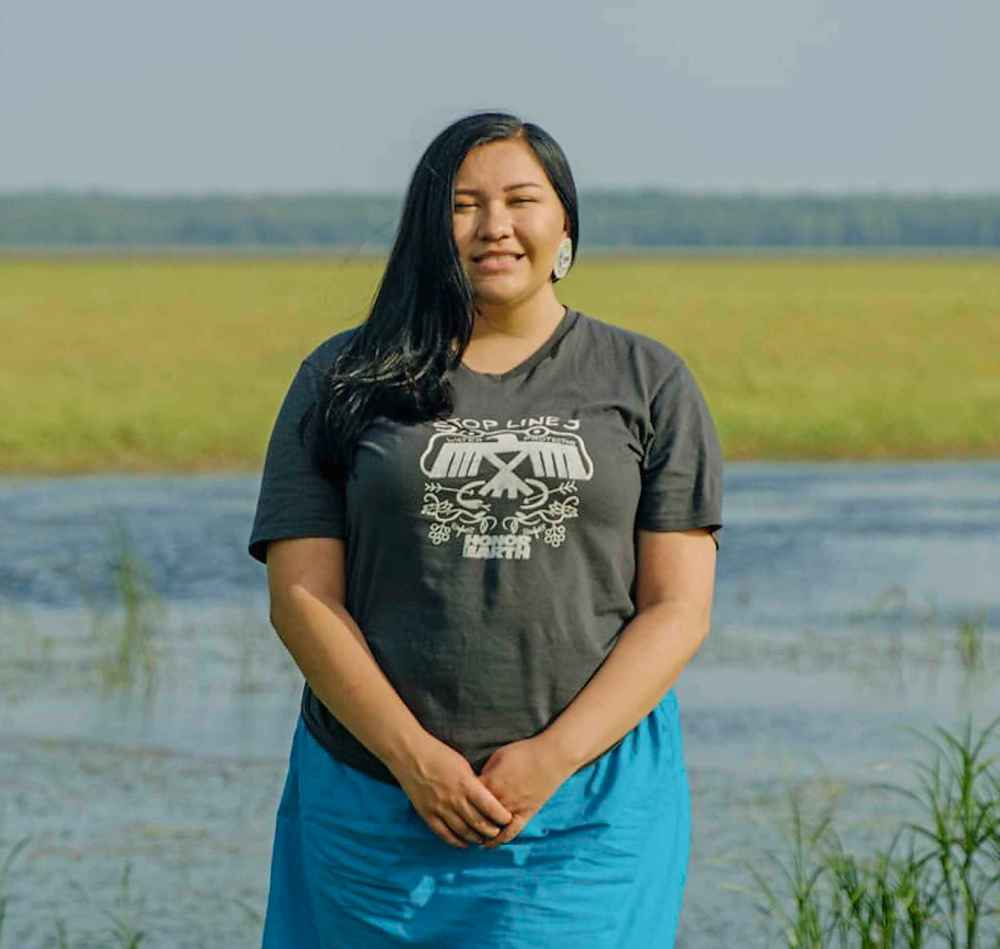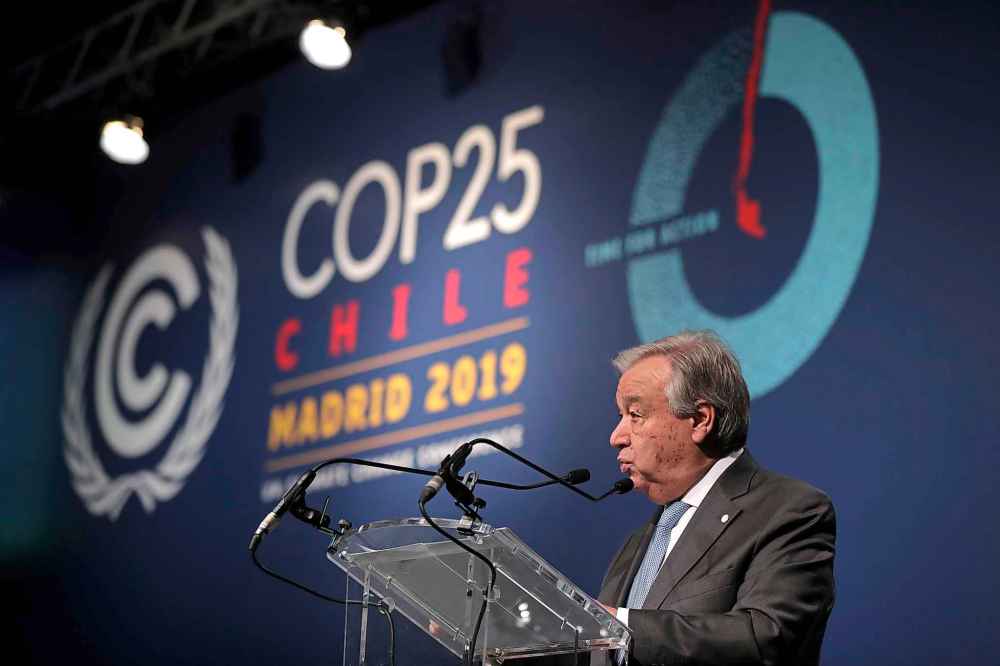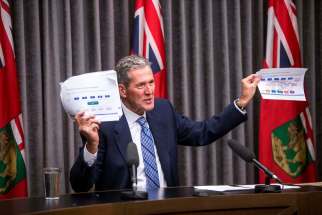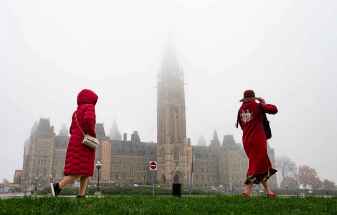Indigenous voices state case on climate change
Read this article for free:
or
Already have an account? Log in here »
To continue reading, please subscribe:
Monthly Digital Subscription
$0 for the first 4 weeks*
- Enjoy unlimited reading on winnipegfreepress.com
- Read the E-Edition, our digital replica newspaper
- Access News Break, our award-winning app
- Play interactive puzzles
*No charge for 4 weeks then price increases to the regular rate of $19.00 plus GST every four weeks. Offer available to new and qualified returning subscribers only. Cancel any time.
Monthly Digital Subscription
$4.75/week*
- Enjoy unlimited reading on winnipegfreepress.com
- Read the E-Edition, our digital replica newspaper
- Access News Break, our award-winning app
- Play interactive puzzles
*Billed as $19 plus GST every four weeks. Cancel any time.
To continue reading, please subscribe:
Add Free Press access to your Brandon Sun subscription for only an additional
$1 for the first 4 weeks*
*Your next subscription payment will increase by $1.00 and you will be charged $16.99 plus GST for four weeks. After four weeks, your payment will increase to $23.99 plus GST every four weeks.
Read unlimited articles for free today:
or
Already have an account? Log in here »
Hey there, time traveller!
This article was published 16/12/2019 (2183 days ago), so information in it may no longer be current.
Swedish teen activist Greta Thunberg was scheduled to speak at last week’s United Nations Climate Change conference in Spain.
The world’s media showed up in droves; Thunberg, 16, has attained a global following (she was recently named Time magazine’s 2019 person of the year).
When she appeared on stage Dec. 9, however, Thunberg stayed silent. She invited Indigenous activists from North America, South America and Africa to speak instead.

Rose Whipple, an 18-year-old Santee Dakota and Ho-Chunk, has led opposition against the Dakota Access Pipeline and the Line 3 pipeline, which carries oil from Alberta into Wisconsin and threatens to impact Anishinaabe lands, sacred sites and waters throughout the Great Lakes.
“Right now, Indigenous peoples worldwide are asking to be listened to and be stood with,” Whipple announced, “and not to be in the background.”
While Indigenous leaders have always attended UN conferences, this year’s 25th meeting on climate change may have signalled the first time the world listened. While global leaders bickered over who were or were not meeting the 2016 Paris greenhouse gas emissions agreement targets, Indigenous leaders sang, danced, and spoke with tremendous impact.
Much of this was in the media/social media, but also on the streets.
For instance, during the Dec. 8 climate march in Madrid, Indigenous communities led 500,000 activists with the slogan “Colonialism caused this Climate Crisis and Indigenous Rights are the Climate Solution.”
Indigenous communities also led demonstrations at the Canadian embassy over the Teck Frontier oilsands mine in Alberta, blocked roads to shine light on the murders of Indigenous activists in Brazil, and held sit-ins to demand Western countries to pay their fair share for climate change.
They made headlines worldwide.
However, by the time negotiations ended Sunday, the conference was largely declared a failure, with no agreement on global implementation of the Paris targets and a weak draft declaration. Critics were quick to point blame at Western corporate lobby groups and a lack of leadership shown by emitting-leading countries such as Canada and the United States.
“I am disappointed with the results of COP25,” UN Secretary-General Antonio Guterres said, “the international community lost an important opportunity to show increased ambition on mitigation, adaptation and finance to tackle the climate crisis.”
It’s worth noting Indigenous voices — particularly young ones — were still heard through the failures.
Kai Tahu activist Kera Sherwood O’Regan, 26, from the collective Indigenous Peoples Organisations, admonished the world for the hypocrisy of the Paris Agreement, which she says enables abuse of Indigenous communities and the Earth, and will lead to global self-harm as “We cannot negotiate with the world.”
“I am disappointed with the results of COP25, the international community lost an important opportunity to show increased ambition on mitigation, adaptation and finance to tackle the climate crisis.”
– UN Secretary-General Antonio Guterres
Visayan/Ilocano leader Orion Camero, who led the first all-Indigenous contingent from environmental group SustainUS, was widely quoted when he said: “Polluting corporations are allowed to use the climate talks as a greenwashing marketing scheme.”
Clips of Indigenous youth such as 17-year old Kichwa and Ecuadorian activist Helena Gualinga went viral. “Countries and companies are violating our human rights, pollute our water and air, and destroying our planet,” she said.

“My ancestors were the original climate activists, beginning at first contact. We’ve sacrificed everything for our lands. We’ve fought, we’ve died,” said Tla’Amin leader Ta’Kaiya Blaney. “We as Indigenous youth are calling on global leaders to do better.”
Indigenous communities closer to home were led by Athabasca Chipewyan leader and executive director of Indigenous Climate Action, Eriel Deranger.
She is not alone in pointing out climate change is impacting Canada. Weather is becoming erratic, flooding and forest fires are becoming frequent, and, according to a report released by Environment and Climate Change Canada this year, the “annual average temperature over northern Canada increased by 2.3 per cent since 1948.”
Deranger, therefore, is insisting Indigenous communities lead the movement to solve climate change, since they are the ones most impacted by it. For Deranger, protecting and honouring Indigenous rights is climate action policy.
It’s not that Indigenous communities have the only ideas to protect the earth and water, but our survival depends on our relations with them.
“It is so incredibly important that we listen to Indigenous peoples,” Thunberg said last week, “because they are hit the most and the quickest by the climate and environmental emergency. They also they have been living in balance with nature for hundreds of years, so we need to listen to them because they have valuable knowledge we need in this crucial time.”
In other words, we are the land.
“It’s time for governments to take a stand on Indigenous rights and a climate stable future,” Deranger said.
So, as Indigenous youth speak and act, the world slowly listens.
Hopefully, it’s not too late.
niigaan.sinclair@freepress.mb.ca

Niigaan Sinclair is Anishinaabe and is a columnist at the Winnipeg Free Press.
Our newsroom depends on a growing audience of readers to power our journalism. If you are not a paid reader, please consider becoming a subscriber.
Our newsroom depends on its audience of readers to power our journalism. Thank you for your support.
History
Updated on Monday, December 16, 2019 7:17 PM CST: Fixes typo









